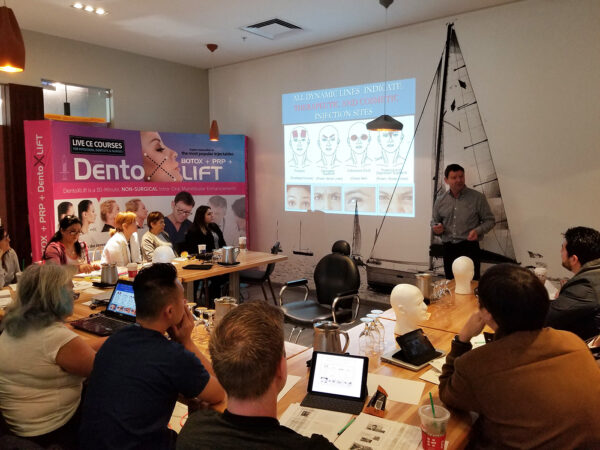
As a nurse, doctor, PA, or licensed medical professional, Botox and filler injection certification may enrich your profession by adding a unique and rewarding dimension.
Have you ever considered exploring esthetic opportunities, such as specializing in Botox treatments?
Botox specialists are highly skilled medical practitioners who have undergone training to administer cosmetic injections, including Botox, Dysport, and various dermal fillers, to clients seeking these treatments. They have undergone specialized training and obtained the necessary licenses to ensure these procedures’ safe and effective provision.
Suppose you are a nurse, physician, physician’s assistant, or licensed medical professional. In that case, you may find that obtaining certification to administer Botox and filler injections could potentially enhance your career by introducing an unusual and fulfilling dimension to your practice.
How Can One Get Licensed to Perform Botox Cosmetic Procedures?
One cannot administer Botox by themselves as a regular esthetician. Prior to anything else, you must hold a license as a healthcare practitioner (such as a physician’s assistant, registered nurse, etc.).
The following actions can help you pursue a career as a Botox injector:
Step 1: Obtain a Qualifying Degree (2-4 years)
The first step is to earn a degree that satisfies the standards set by your state for the administration of injectables and dermal fillers. Only qualified medical professionals should administer Botox injections. A medical degree, nursing degree, physician assistant degree, or medical technology degree are just some of the options available to you.
Step 2: Get Clinical Experience (1-2 years recommended)
The next step is to spend at least a year and a half learning from and gaining experience working alongside actual doctors and other licensed medical professionals. Employment and internship opportunities may be sought in medical practices, dermatology practices, and plastic surgery clinics where injectable treatments are routinely administered.
Step 3: Finish an Intensive Botox Course (4-8 Weeks)
Sign up for a Botox administration certification program that is recognized and reputable. Over the course of four to eight weeks, participants in these intensive certification programs will learn and practice various injection techniques under the guidance of trained professionals.
Step 4: Earn Certification (1-2 months)
Apply for licensure to the medical licensing board in your state and include copies of your degree, certificates of completion, and proof of liability insurance. The approval process can take up to two months.
Step 5: Apply for a Business License (1-2 months)
If you plan to start your own medical practice, you should allocate one to two months to the process of applying for the required local business licenses, health permits, and insurance policies.
Step 6: Establish Your Practice (6 months – 1 year)
It is advisable to allocate a sufficient timeframe of approximately six months to one year after obtaining your certification to successfully set up your private practice, promote your services, and cultivate a solid client base. Ongoing training plays a crucial role around this time.
The estimated timeline for completion may vary between three and five years, considering the individual’s prior experience in the medical field.
It is advisable for aspiring injectors to take their time and approach the process with patience. It is advisable to consider investing time in enhancing your skill set through comprehensive training and gaining clinical experience before embarking on the independent administration of injectables. This approach can yield valuable benefits in the long run. The most accomplished Botox injectors prioritize acquiring the necessary credentials, knowledge, and practice to thrive in this specialized field.
What Kind of Education and Abilities Are Necessary for This Profession?
Coursework in a relevant subject area is necessary for building a solid foundation in the discipline. Find a training program that offers courses in medical ethics and regulations, laser technology training, facial anatomy and physiology, and the pharmacology of Botox, injection procedures, and aseptic methods. Certificate and degree completion are expected outcomes of such courses.
In addition to having a firm grasp on fundamentals, you’ll also require strong interpersonal skills. Empathy and bedside manners, listening attentively during consultations, communicating clearly, educating patients, and respecting their privacy are all essential components of quality healthcare. The best injectors have both professional knowledge and a caring nature.
Last but not least, injectors’ aesthetic sense allows them to foresee results and boost clients’ innate beauty with refined techniques. As a Botox injector, you’ll find that an eye for proportion and symmetry is vital.
How to Choose the Best Botox Administration Course

Before choosing a Botox training program, examine it and consider all factors, not just speed, affordability, or convenience.
When selecting a program, it is advisable to conduct thorough research and consider various factors rather than solely focusing on its speed, cost, or convenience. Investing in a quality education can yield significant benefits at every step of your professional life.
Below are some suggestions on how you can identify a suitable Botox training program for your needs:
- Please ensure that the program you are considering is accredited and approved in your state. It is generally considered beneficial for programs to obtain proper operating licensing and issue certification.
- Find out as much as you can about the instructors’ experience. Find a medical professional who has years of experience in the field.
- Inquire about the ratio of teachers to pupils in classes promising practical experience. Thanks to the small class sizes (8:1 or fewer), you’ll get plenty of one-on-one care.
- Find out if they arrange for you to receive training on actual patients so you can practice using different facial muscles and interacting with patients.
- Find out if there is any required reading, courses, or other preparation you need to do before the start of the program. Prerequisites are a hallmark of any high-quality curriculum.
- Inquire in-depth about the instructors’ pedagogical approaches, years of experience, course outlines, and certification exam preparation strategies.
Dentox’s extensive education and training program offers medical professionals like yourself a valuable opportunity to impact your patients’ lives significantly. You can help individuals achieve their desired cosmetic outcomes by providing expert guidance and support, ensuring a smooth and worry-free experience.
For a wide range of distance learning programs, we kindly suggest visiting our web page at https://dentox.com/all-courses/botox-training/. If you are interested in a more interactive learning experience with practical patient instruction, we kindly suggest considering the excellent alternatives offered at https://dentox.com/live-courses/.







